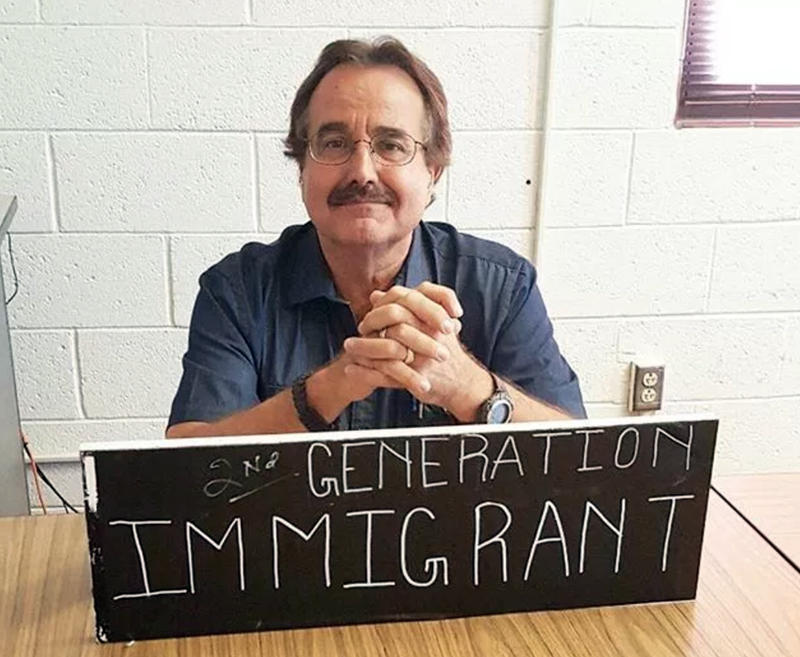krwg.org
We’ve all seen those Facebook posts from a friend or family member that make you feel uncomfortable because they seem so extreme. What do you do? Post an angry reply? Block their posts?
One group of New Mexico State University students is trying to counter extremism and violent language surrounding the topic of immigration with a communication campaign on social media.
The NMSU project is titled Spreading Peace and Countering Extremism (SPACE). NMSU students in professor Kenneth Hacker’s political communications class have created a communication plan using a website and social media channels to challenge pre-conceived notions about immigrants and to open discussion about immigration and the recent presidential election.
“We live in a very interesting political area,” said Shannon Eiffle, an NMSU senior government major involved in the project. “Being right on the border, we hear so many different views of immigration. Our entire goal is that discussion of these issues remain safe,” she said. “So the rhetoric can be stabilized and kept from becoming violent.”
The NMSU group is joining teams from colleges and universities across the United States as part of “Peer to Peer: Challenging Extremism.” The project initiated by Edventure Partners and the U.S. Department of Homeland Security is sponsoring a competition for college student groups to design and execute social media strategies to counter extremism as part of their coursework. The three most promising ideas will have their campaigns launched in the marketplace.
Hacker, NMSU professor and department head of communications studies in the College of Arts and Sciences, is spearheading the project.
“Our goal was to approach this subject through peer to peer public diplomacy,” said Hacker. “In this challenge, university students develop and execute campaigns and social media strategies against extremism in a way that is clear by their peers. This enables students from different parts of the world to discuss the topic and create a level of peaceful discourse to discourage extremism.”
The team’s campaign seeks to counter the violent language used to incite the public that has become more prominent since the 2016 presidential election.
Their goal is to create a place where others can discuss this subject openly, while countering the extremism that comes from both sides.
“We want these subjects to be a safe place for people,” said Maria Vitola, a graduate student studying Geography. “Our goal is to provide a place for peaceful dialogue.”
Each student was split into different groups that helped to develop the campaign. The teams included budget, metrics, production, social media and public relations.
“We took this one step at a time,” said Andrew Potter, a graduate student studying communications studies. “We were able to be creative with what we were doing, and make sure we focused on each part of this topic.”
NMSU’s SPACE team received $2,000 in funding from Facebook and the U.S. State Department and another $500 from Edventure Partners as part of their start-up with the campaigns. They then used part of that money to fund different events on campus where the students gave out t-shirts and baked goods in exchange for filling out the team’s survey. Survey questions included ones like “Have you ever seen negative discourse about the 2016 presidential election on social media?” which then opened the conversation for discussion on violent discourse.
They have also used much of their funding on Facebook ads, where the team shares videos and pose questions about political discourse. They measured the interaction from others through Facebook analytics and sentiment analysis.
During the first semester of the campaign last fall, there was not enough interaction on the site to measure, so the team started making adjustments to their campaign. “We are making plans for innovating new videos, logos, content and events for both on and off-campus to generate more interaction,” said Hacker. “We wanted to take what we learned previously and grow from there and this semester we have had much more interaction on Facebook and face-to-face.”
Currently, there are 60 teams working on projects for Edventure, all with different topics aligning with the same theme of countering extremism through social media strategies that are credible, authentic and believable to their peers in conversations about a sensitive subject.
U.S. Department of Homeland Security recognizes the top three teams with scholarship awards ranging from $5000 to $1000. Winners will be announced over the summer.
“Throughout this entire process, I’ve learned a lot,” said Potter. “Whether we are chosen to or not, I hope that we taught someone something.”
Information from NMSU

No comments:
Post a Comment